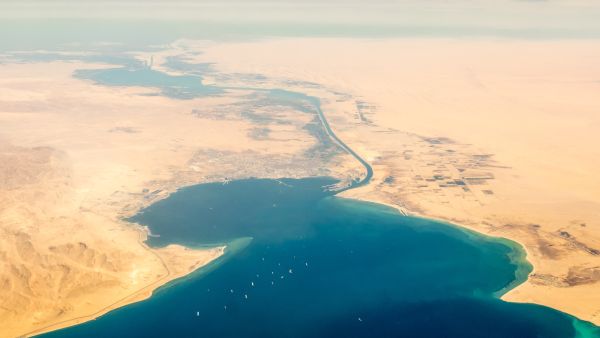The developments caused by the Ever Given cargo ship in the Suez Canal over the past week have triggered many questions over the role the famous trade route plays in the global economy.
Egypt made $27.2 billion from The Suez Canal from 2015-2020 and $25.9 billion from 2010-15.
— Africa Facts Zone (@AfricaFactsZone) March 26, 2021
It connects the Mediterranean Sea to the Red Sea through Isthmus of Suez.
Constructed from 1859-1869.
It handles 12% of global trade and is the world's most important navigation route. pic.twitter.com/iG85v4kBGb
News showing the huge container ship blocking traffic through the waterway on the 23rd of March has not only alarmed the world of the need to reexamine trade routes and ships' sizes but has also highlighted the importance of narrow waterways to the global economy.
In a world suffering already an on-going economic shock, influenced by the COVID-19 pandemic, millions around the world were terrified to imagine another hit to the global trade, if the Suez canal was to be blocked for longer weeks, as expected by maritime experts.
Luckily and thanks to Egyptian efforts, Ever Given was refloated in less than a week of being wedged horizontally in the canal, making space for other ships to overflow across from and to the Red Sea and the Mediterranean.
In this article, we embark on a mission to learn more about the Suez Canal and its role in international trade.
"Construction (of the Suez Canal) began in April 1859, and at first digging was done by hand with picks and shovels wielded by forced laborers."
— Potato Head (@airbrushfumes) March 31, 2021
Regarded as one of the shortest and most effective trade routes in the world, the Suez Canal has served the world for over 160 years, as people have found it to be a faster and more cost-effective way to transport products from Asia to Europe than the old Cape of Good Hope way.
Typically and prior to the latest incident, about 50 cargo ships used to pass through the Suez Canal every day. According to several sources, goods and products transferred across the Suez canal make up between 10% and 15% of the global trade.
In 2018, the Suez Canal reported a record high annual revenue reaching up to $5.585 billion, which have been linked to expansion projects that were initiated by the Egyptian President Abdel Fattah Al-Sisi in 2014.
According to Business Insider, delays in shipments caused by the week-long blockage that has just ended on Monday has cost international brands $400 million an hour, which if anything, points to the crucial role the canal plays in global trade.
Moreover, the delay of oil and natural gas shipments sent from the GCC to Europe through the Suez Canal had a very clear impact on oil prices that spiked sharply during the crisis, before dropping to its pre-blockage prices shortly after Ever Given was refloated two days ago.
What other reasons make the Suez canal one of the most important trade routes in the world?






